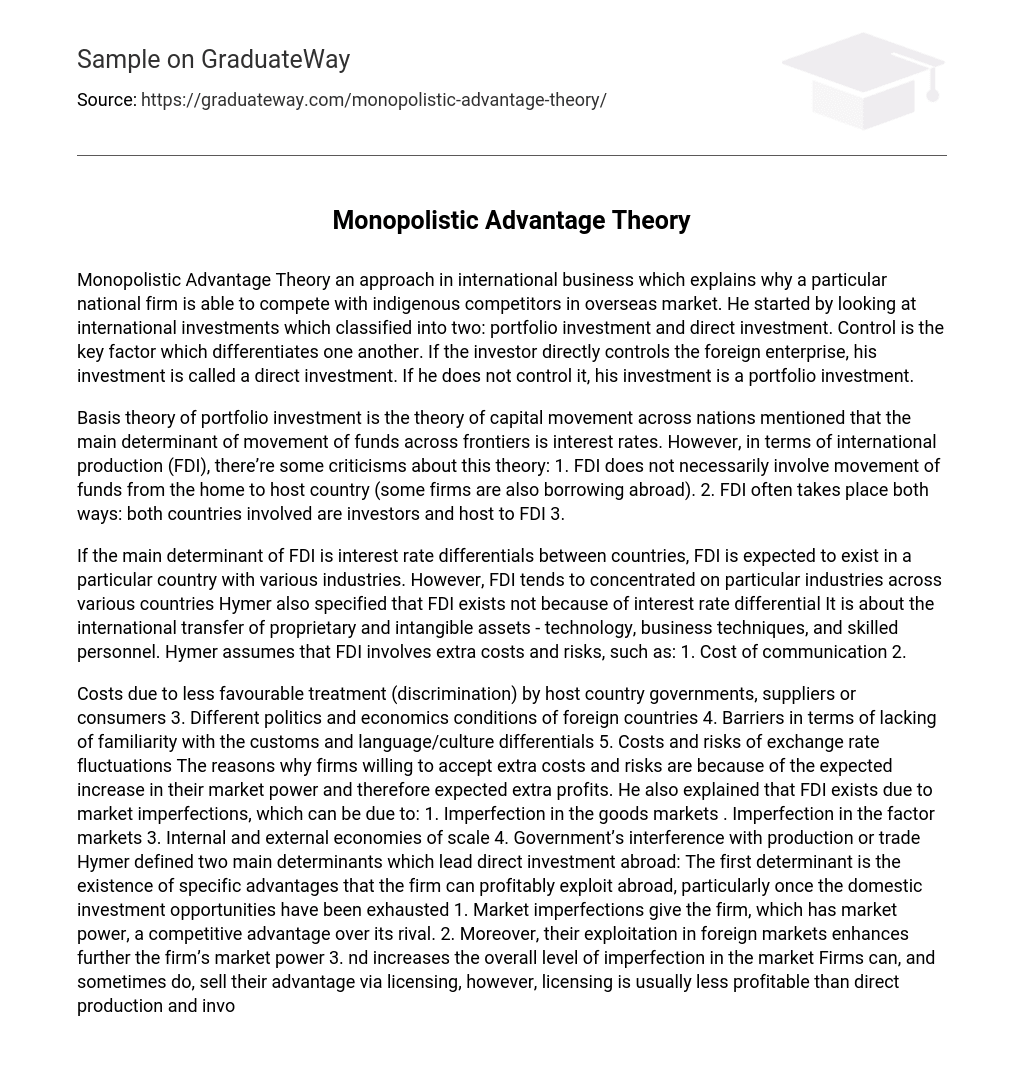Monopolistic Advantage Theory an approach in international business which explains why a particular national firm is able to compete with indigenous competitors in overseas market. He started by looking at international investments which classified into two: portfolio investment and direct investment. Control is the key factor which differentiates one another. If the investor directly controls the foreign enterprise, his investment is called a direct investment. If he does not control it, his investment is a portfolio investment.
Basis theory of portfolio investment is the theory of capital movement across nations mentioned that the main determinant of movement of funds across frontiers is interest rates. However, in terms of international production (FDI), there’re some criticisms about this theory:
- FDI does not necessarily involve movement of funds from the home to host country (some firms are also borrowing abroad).
- FDI often takes place both ways: both countries involved are investors and host to FDI
- If the main determinant of FDI is interest rate differentials between countries, FDI is expected to exist in a particular country with various industries.
However, FDI tends to concentrated on particular industries across various countries Hymer also specified that FDI exists not because of interest rate differential It is about the international transfer of proprietary and intangible assets – technology, business techniques, and skilled personnel. Hymer assumes that FDI involves extra costs and risks, such as:
- Cost of communication
- Costs due to less favourable treatment (discrimination) by host country governments, suppliers or consumers
- Different politics and economics conditions of foreign countries
- Barriers in terms of lacking of familiarity with the customs and language/culture differentials
- Costs and risks of exchange rate fluctuations
- The reasons why firms willing to accept extra costs and risks are because of the expected increase in their market power and therefore expected extra profits.
He also explained that FDI exists due to market imperfections, which can be due to:
- Imperfection in the goods markets
- Imperfection in the factor markets
- Internal and external economies of scale
- Government’s interference with production or trade.
Firms can, and sometimes do, sell their advantage via licensing, however, licensing is usually less profitable than direct production and involve the risk of poor control over the quality of production and the risk of losing their monopoly over specific knowledge and technological advantages. The second determinant is the removal of conflicts with rivals. If rival firms are already operating in the foreign market or trying to get into it, a conflictual situation emerges.
Our specific firm can collude and share market with rivals or can try to get direct control of production abroad. In either case the conflict with other firms is removed.
- Removal of conflicts through the acquisition of control of foreign operations, leads to an increase in the firm’s market power
- And again, it leads to the increase in imperfection for the market. A third, minor reason for FDI on the part of large firms as the driver towards diversification; a strategy of diversification – of products or market locations or production locations – helps to spread risks.
The limitation/criticism of Hymer Theory: Hymer did not concentrate on any particular advantage, nor did he consider whether all advantages were equally suitable as a basis for international operations. A related point is that Hymer did not sufficiently examine the role of exporting in the utilization of advantages, or how the inter-industry pattern of international operations and export intensity may be related to the extent and distribution of different sorts of advantages between firms and industries.
According to Hymer, lack of international integration, costs and disadvantages of foreigners were the basis of the barriers to international operations. In an imperfectly integrated world economy the concept of monopolistic advantage as a prerequisite of international operations has strong theoretical appeal. However, with increasing international integration and the reduction in the cost of international operations, this relevance may be progressively undermined, as the possession of firm specific advantage may no longer be necessary in order to offset such costs.
The theory of firm specific advantage could only explain horizontal FDI. In fact for a long time vertical FDI was ignored, which means that theory was not applicable to vertical FDI. Hymer emphasized more on structural market imperfection but neglect the transactional market imperfections.
On the one hand, Hood and Young (1979) noted that firm specific advantages were believed to have acquired by MNE in imperfectly competitive environment. On the other hand however, some writers such as Buckley (1985), Casson (1987) and Rugman (1981) have argued that ownership specific advantages theory of international operations, are in fact not necessary to explain the existence of FDI.
Above criticisms show that FSA has more weaknesses, but the second motive proposed by Hymer, removal of competition through collusive agreements, did not seem to receive as much attention as the first one. Informal or formal collusive agreements are recently beginning to appear as a factor inducing firms to go abroad and appropriate rents (Casson, 1987; Cowling and Roger, 1987). Due to the fact that the latest approach of Hymer has not drawn attention until recently, the theory of MNEs was redeveloped under different names and Hymer’s contribution remained somewhat controversial and incomplete.





